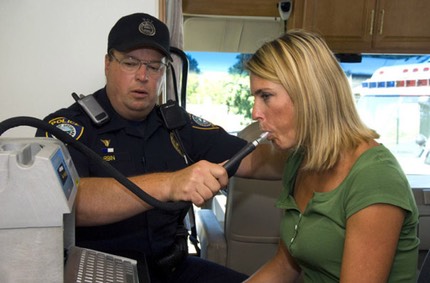The implied consent law in New Jersey says that you must comply with a breath alcohol test if suspected of driving while intoxicated. If you do not comply you shall recieve a summons in which you are presumptively guilty of DUI regardless of whether you had anything to drink, making these very difficult cases to defend.
Despite the difficulty these cases present, however, with 40 years Experience as a NJ DUI Refusal Attorney, Avery & Avery has one of the top success rates in the State, utilizing the newest techniques and our vast trial experience to keep you out of trouble and on the road. For a free consultation, give us a call at 201-943-2445.
What are the Penalties?
The possible penalties depend on the level of intoxication as well as if there are any prior offenses.
1st Offense:
- $250 - $400 Fine + Assessments
- 12-48 Hours in IDRC (Intoxicated Drivers Resource Center)
- Possible Ignition Interlock Device on Your Vehicle
- 3 Month License Suspension
- Up to 30 Days in Jail
2nd Offense:
- $500 - $1,000 Fine + Assessments
- 30 Days Community Service
- 24 Month License Suspension
- Minimum 2 Days in Jail and up to 90 Days
- Screening and Evaluation by the IDRC
- Installation of Ignition Interlock Device for 1-3 Years
3rd or Subsequent Offense :
- $1000 Fine + Assessments
- Possible Community Service
- 10 Year License Suspension
- Minimum 180 days in Jail
- Screening and Evaluation by the IDRC
- Installation of ignition interlock device for 1-3 years
In addition to the above, for any Drug DUI, New Jersey will assess a surcharge against you for $1,000 for each of the following three years.
Can I Fight my Refusal Charge?
Refusal cases are more difficult defend than a typical drunk driving charge. The law on refusals is governed by N.J.S.A. 39:4-50.2, which you can find here. This statute makes it illegal in any case, drunk or not, to refuse chemical breath tests.
Even so, there are other routes of defense that circumvent the refusal all together. For a free consultation on how we can help, please call today.

Frequently Asked Questions
They asked for blood which I refused, is that okay?
Blood tests are usually only asked for in the context of someone who is hospitalized and cannot make it to the police station for breath testing. In this context you may refuse to provide blood samples, particularly if you are afraid of needles, told the police the same, and actively fought them taking your blood.
Even so, if they do take your blood in leiu of breath samples, there are many technical defenses with the blood draw itself, as well as chain of custody issues that may be raised to invalidate the test.
Should I just take the test?
In most cases it is advisable take the alcotest (breathalyzer). If you refused however, there are possible defenses, and always a way we can help one way or another.
What is the IDRC?
The Intoxicated Driver Resource Center (IDRC) is a program designed to educate about and deter drunk driving. You must complete this program before your license may be reinstated. For more information see here.
What is an ignition interlock?
An ignition interlock is a device that is attached to your car and prevents it from starting if you have a BAC over .05, measured by its internal breathalyzer. For more information click here.
I was charged with DUI in a School Zone, what does that mean?
Under N.J.S.A. 39:4-50(g), there are significantly enhanced penalties if you are caught drunk driving in a school zone. It does not matter what time of day it is or whether children are present. The penalties for a first offense are as follows:
- $500-$800 fine
- 12-24 month driver’s license suspension
- Possible 60 days in jail
These penalties are in addition to the other penalties for your separate DUI or Refusal tickets. There are more severe penalties for repeat school zone offenders. For a full list see section G of N.J.S.A. 39:4-50, here.
What drugs can I be convicted for being under the influence of?
In NJ, any drug that may impair your ability to drive may sustain a DUI conviction. These include all illicit drugs, Marijuana, Cocaine, Methamphetamine, Heroin, LSD, etc, as well as any prescription drug which may impair your ability to drive.
What is the IDRC?
The Intoxicated Driver Resource Center (IDRC) is a program designed to educate about and deter drunk driving. You must complete this program before your license may be reinstated. For more information see here.
What is a Drug Recognition Expert?
In all Driving under the Influence (DUI) of drugs cases, except marijuana, the police must have you evaluated by a Drug Recognition Expert (DRE). These are specially trained police officers who may recognize the symptoms of drug intoxication. Their reports are used in lieu of a breathalyzer test.
In Marijauna cases, given its prevalence in society, the court allows the testimony of normally trained police officers to prove guilt of driving under the influence of pot.
Should I take the field sobriety tests?
Unlike the implied consent law regarding the alcotest / breathalyzer which require you to supply breath samples, you are not required to take part in field sobriety tests. The police use these tests only to accumulate evidence to convict you, they are not for your benefit. We encourage clients unless completely confident in their ability to politely refuse the tests.
Is there any difference between DUI and DWI?
The names are slightly different, Driving under the Influence (DWI) and Driving While Intoxicated (DWI), but they cannote the same thing. In New Jersey, they both refer to N.J.S.A. 39:4-50, which is the drunk driving / impaired driving statute.
I have a prior DUI / DWI in another state, will this count as a second offense or third offense?
Depending on which state you were convicted in and what their drunk driving law is, it may or may not. Generally if you were caught drinking in another state with a Blood Alcohol Concentration (BAC) over .08, your prior conviction will count towards enhanced penalties. There are fairly common situations however in which we can have your out of state DUI conviction not count for purposes in NJ.
I was completely stoned, is the case over?
In some situations the police have caught the defendant dead to rights and there are no defenses. Even in these situations where the defendant was falling over drunk, the case can be thrown out if there was no probable cause for the initial motor vehicle stop. Even if there are no defenses, the Attorney's of Avery & Avery, still help clients by having most other charges thrown out and reducing penalties to the minimums, which for a first offender could mean the difference between a 7 month license suspension and a several year suspension depending on the circumstances.
I barely drank or was sober but the machine gave me a high reading, is there anything I can do?
This is an unfortunate situation which happens more frequently than one might think. These cases often require bringing in an expert to testify as to the machines malfunction, possibly allowing the charges to be dropped. Additionally even with a high reading you may still have various defenses which only an experienced DUI Defense Lawyer would recognize.
Is there anyway around jail time if convicted?
In most situations it is possible to avoid jail time completely. In others there are a few methods usable to avoid the harshest consequences of jail such as the loss of a job. These include time served only at night or on weekends, among others. These options are all at the discretion of the judge and must be argued for by your lawyer.
What do I tell the police?
We give the same answer to all clients regarding all criminal charges, say nothing! Until you talk to your NJ Criminal Defense Lawyer.
How will my DUI charge affect my immigration status?
This is not a simple question. Depending on what your status is, and what your charges are, there can be vast consequences including deportation from the United States. Generally a conviction under N.J.S.A. 39:4-50, is not considered as a removeable offense. However under certain aggravating circumstances such as if you were driving on the revoked list, as well as several others, a NJ conviction for DUI could affect your immigration status.
I have been caught on this before is there anyway around the additional penalties?
If your prior DUI was more than 10 years prior your penalties will be stepped down. This means if it is your second DUI but your first one was 11 years ago, it will count as a first offense for sentencing purposes. Also if you were indigent and without an attorney during your first DUI conviction you may qualify to have your sentence reduced.
It was in a school zone how does that affect the case?
School zone cases present the strictest penalties under New Jersey's DUI law. As such it is even more urgent to be represented by an experienced Drunk Driving Attorney if you have been charged with a school zone offense. The additional penalties include:
- For a first offense mandatory 1 year and up to 2 years loss of license, a large fine, and possible 60 days in jail.
- A second offense includes a large fine, 60 days community service, a minimum of 4 days in prison but up to 6 months, and a 4 year license suspension.
- A third offense in a school zone shall result in a large fine, 6 months in jail, and a 20 year license suspension.
They found marijuana in the car, what happens?
For a full discussion on NJ Marijuana laws, see here.These cases are just like any other weed possession case. The penalties remain the same, as does the possible 2 year suspension of drivers license. Posession of pot in a motor vehicle opens many avenues of possible defense however. There are many possible defects in the way the police handled the case that could result in suppression of evdience against you. To determine if this is a possibility, please contact one of our lawyers at 201-943-2445.
What happens with a DUI checkpoint?
DUI checkpoints are a common device used by the police to catch drunk drivers. NJ provides several protections against unlawful police checkpoints. The police must comply with certain procedures to ensure the stops lawfulness. If they have not complied with these procedures, any evidence collected may be excluded from prosecution.
IMPLIED CONSENT TO THE BREATH TEST
Whether you know it or not, New Jersey law provides that any person who operates a motor vehicle on any public road, street or highway or quasi-public area in this State is deemed to have given his consent to the taking of samples of his breath for the purpose of making chemical tests to determine the content of alcohol in his blood; provided, however, that the taking of samples is made in accordance with the provisions of this act and at the request of a police officer who has reasonable grounds to believe that such person has been operating a motor vehicle in violation of the provisions of NJSA 39:4-50.
The law further provides that a record of the taking of any such sample, disclosing the date and time thereof, as well as the result of any chemical test, will be made and a copy thereof, upon his request, shall be furnished or made available to the person so tested.
In addition to the samples taken and tests made at the direction of a police officer, the person tested is permitted to have samples taken and chemical tests of his breath, urine or blood made by a person or physician of his own selection.
The police officer shall inform the person tested of his rights under the provisions of N.J.S.A. 39:4-50.2.
The law further provides that no chemical test, or specimen necessary thereto, may be made or taken forcibly and against physical resistance thereto by the defendant. The police officer shall, however, inform the person arrested of the consequences of refusing to submit to such test. The penalties for refusing to take the breathalyzer or alcotest essentially parallel those of a drunk driving prosecution and are as follows:
Refusing the Chemical Test
First Offense (For Refusing)
• 7 months to 1 year driving privilege suspension
• $300-$500 fine
• 12 hours minimum IDRC
Second Offense (For Refusing)
• 2 years driving privilege suspension
•$500-$1,000fine
•12 hours minimum IDRC
Third and Subsequent Offenses (For Refusing)
• 10 years driving privilege suspension
• $1,000 fine
• 12 hours minimum IDRC
Refusing Chemical Test in School Zone or Crossing
First Offense (For Refusing)
• 1 to 2 years driving privilege suspension
•$600-$1,000fine
•12 hours minimum IDRC
Second Offense (For Refusing)
• 4 years driving privilege suspension
• $1,000-$2,000 fine
• 12 hours minimum IDRC
Third and Subsequent Offenses (For Refusing)
• 20 years driving privilege suspension
• $2,000 fine
• 12 hours minimum IDRC
The above penalties are for refusing-refusal only, and are on top of any penalties imposed for DUI, DWI, DRUNK DRIVING.
WHAT ARE THE ELEMENTS OF A REFUSAL PROSECUTION?
There are four essential elements to sustain a refusal conviction:
(1) the arresting officer had probable cause to believe that defendant had been driving or was in actual physical control of a motor vehicle while under the influence of alcohol or drugs (prior to the refusal);
(2) defendant was arrested for driving while intoxicated (prior to the refusal);
(3) the officer requested defendant to submit to a chemical breath test and informed defendant of the consequences of refusing to do so (prior to the refusal); and
(4) defendant thereafter refused to submit to the test.
ARE THERE DEFENSES TO A REFUSAL PROSECUTION?
YES! Each of the elements of the offense can be challenged from the probable cause for the officer making the stop in the first place, to the nature of the request, to the warnings given and the nature of the refusal by the defendant.
CAN THE WARNINGS AGAINST REFUSAL GIVEN BY THE POLICE BE CHALLENGED?
YES! In fact the warnings which had been given by the police as directed by the office of the Attorney General are currently under challenge in an appeal to the New Jersey Supreme Court in the matter of State v William O'Driscoll. Although the matter is lengthy and technically complicated, it boils down to the fact that the warnings given by the police against refusal may be inadequate in that they do not in fact completely advise a defendant of the potential penalties for refusing the breath test. The defense is highly technical, but can be highly effective.
HOW WE CAN HELP.
The lawyers at Avery & Avery are extremely experienced in DWI, DUI, Drunk Driving and Refusal cases, and can guide you through the maze of complicated laws, court decisions and defenses, to achieve the best possible result in your DWI, DUI, Drunk Driving or Refusal case. Call us for your Free Initial Consultation at 201-943-2445.

